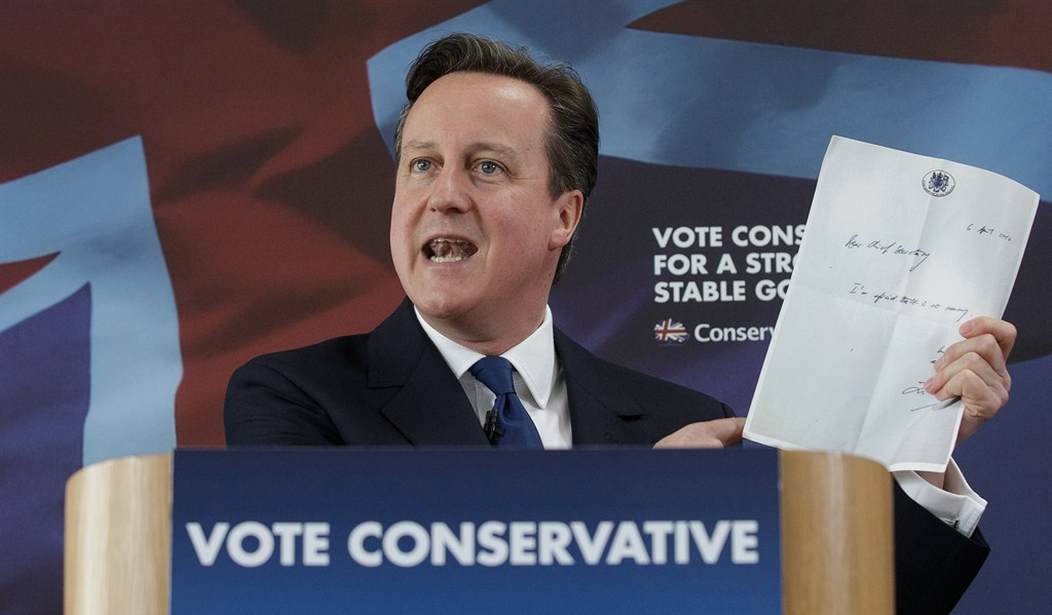Advertisement
Once the election returns are in tomorrow night, it's just a matter of coalition-building, a game that resembles musical chairs. All the political parties that poll a share of the vote, however minuscule, proceed to circle each other warily until "Rule, Britannia" stops playing and then begin scrambling for seats in the next cabinet. ("I'll give you Home for Defence with Work and Pensions thrown in....")
You won't need a scorecard to tell all the players but an encyclopedia, considering the number of political parties involved. In that respect, the game of piecing together the next British cabinet bears a distinct resemblance to Monopoly as the players negotiate for the most prized properties on the board -- like Park Place and Boardwalk -- but may have to settle for lesser but still strategic assets like Baltic and Mediterranean.
To keep up with all this politicking, you'll need to know the cast of characters in this protracted drama. Some will be familiar faces, like the current prime minister David Cameron, who is forever trying to pass himself off as a Man of the People, but it's hopeless. He's got the map of Mayfair on his ruddy face and a plush accent to go with it. You'd no more mistake him for a plebeian as you would a pub for a wine bar.
To quote Hugo Rifkind -- a long-time observer of British politics, society and mores, which have a way of blending into one highly hierarchical culture -- the prime minister is "beleaguered by accusations that he's too rich and privileged to understand anybody else. He often appears to genuinely not understand these accusations, thereby creating the strong impression that they're true."
Recommended
Advertisement
A poor little rich boy, the PM understands that the best argument for his re-election is the quality of the alternatives. Such as:
Ed Miliband, who won his post as leader of the other major party -- Labour -- by defeating his older brother. Blood, it seems, is thinner than water, or at least political ambition. That's been true enough since the rise of the Tudors in not so jolly old England -- but now Labour's appeal has dropped precipitately where it was once strongest: Scotland.
It seems the Scots have been bitten by the nationalist bug and produced a party of their own with a program of its own: independence. Which has cut into Labour's support there dramatically. Nicola Sturgeon is not a fish but the leader of the Scottish National Party, which almost achieved its goal of Scottish independence last year, drawing 45 percent of the vote. Now the same party that sought to leave the United Kingdom seeks a role in governing it. Such are the weird workings of nationalism, whose excesses may leave the nation it professes to love alone and isolated, cut off from the empire that once sheltered and indulged it.
Then there's Nick Clegg, currently deputy prime minister and leader of the Liberal Democrats, the alternative to both major parties. Mr. Clegg was the great hope of British politics some five years ago, but he's since faded into irrelevance as nationalist parties have sprouted like weeds, undercutting any appeal a Third Force might once have had. Still, the Liberal Democrats may be needed by the Big Two to form Britain's next government, and so find themselves in an influential bargaining position.
Advertisement
The rest of this overcrowded field is filled with the same kind of self-destructive nationalist parties that no longer value the safe harbor the British Empire once afforded them. The result could be a balkanized Britain as various ethnic, geographic and linguistic subdivisions of the British isles decide they're separate nations and try to strike out on their own: the Welsh, Northern Irish, you name it, they proliferate.
It might take us former colonials to appreciate the stability the British Empire once lent the world as less benign empires now re-emerge: the old Stalinist Russia, rampant again under Comrade/President/Czar Putin; a new Caliphate so bloody-minded that any true son of Saladin the Magnificent would be ashamed to claim it....
Lost is the balance of power that once assured a measure of peace, however uncertain, in the world. Empires like the Ottoman and Austro-Hungarian contained feuding nationalities by tolerating them. The British Empire, too, has been an invaluable source of stability in the world. It wasn't until those in charge of it abused their power that we Americans were driven to leave it, and then only after long hesitation. (Has there ever been a more reluctant bunch of revolutionaries than our Founding Fathers?)
All of which explains why some of us are rooting for the Brits to muddle through, which was once a specialty of theirs, and hold together somehow. It's a common enough sentiment among those of us who may be outside the Empire now but remember it fondly. It's called Anglophilia.
Advertisement
I once met a Jewish tailor in Mexico City after he had fled Vilna in Poland to follow the British around the world in search of a safe haven during the war-torn 1940s. He had tried Canada for a while, but "Montreal has only one season: winter." Something he said has stuck with me: "The English are a cold people, but they have character." And to some of us, character is still all.

























Join the conversation as a VIP Member